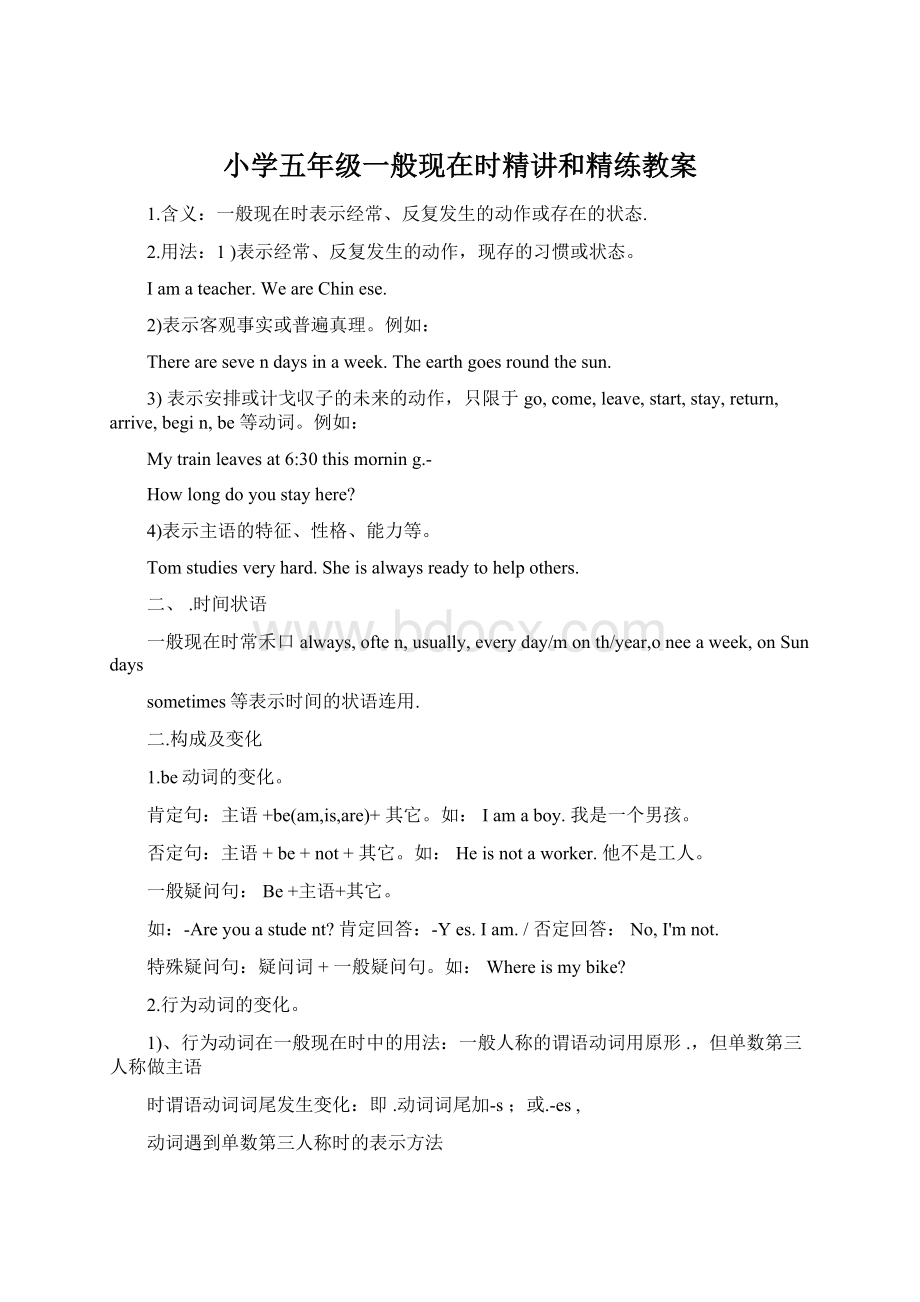小学五年级一般现在时精讲和精练教案.docx
《小学五年级一般现在时精讲和精练教案.docx》由会员分享,可在线阅读,更多相关《小学五年级一般现在时精讲和精练教案.docx(9页珍藏版)》请在冰豆网上搜索。

小学五年级一般现在时精讲和精练教案
1.含义:
一般现在时表示经常、反复发生的动作或存在的状态.
2.用法:
1)表示经常、反复发生的动作,现存的习惯或状态。
Iamateacher.WeareChinese.
2)表示客观事实或普遍真理。
例如:
Therearesevendaysinaweek.Theearthgoesroundthesun.
3)表示安排或计戈収子的未来的动作,只限于go,come,leave,start,stay,return,arrive,begin,be等动词。
例如:
Mytrainleavesat6:
30thismorning.-
Howlongdoyoustayhere?
4)表示主语的特征、性格、能力等。
Tomstudiesveryhard.Sheisalwaysreadytohelpothers.
二、.时间状语
一般现在时常禾口always,often,usually,everyday/month/year,oneeaweek,onSundays
sometimes等表示时间的状语连用.
二.构成及变化
1.be动词的变化。
肯定句:
主语+be(am,is,are)+其它。
如:
Iamaboy.我是一个男孩。
否定句:
主语+be+not+其它。
如:
Heisnotaworker.他不是工人。
一般疑问句:
Be+主语+其它。
如:
-Areyouastudent?
肯定回答:
-Yes.Iam./否定回答:
No,I'mnot.
特殊疑问句:
疑问词+一般疑问句。
如:
Whereismybike?
2.行为动词的变化。
1)、行为动词在一般现在时中的用法:
一般人称的谓语动词用原形.,但单数第三人称做主语
时谓语动词词尾发生变化:
即.动词词尾加-s;或.-es,
动词遇到单数第三人称时的表示方法
在一般现在时中,当主语是单数第三人称时,行为动词的形式是在词尾加-s或-es具体
方法如下:
(1)多数动词直接加s:
runsgetslikescolletstakesplayselimbs?
?
.
(2)结尾是s,x,sh,eh,o,前为辅音字母,
结尾力口es:
watchesteaches—goesdoeswashescrosses—mixesbrushes
⑶动词末尾y前为辅音:
将y改为i加es:
study—studiesflyTies
carryfcarriescryfcries
但在y前如果为元音则直接加s:
buyssays
注意:
动词加-s以后的读音
1.在[p][t][k][f]
等清辅音后,
发清辅音/s/eg.helps,works,likes,hates,laughs
2.在浊辅音和兀
音后,
发浊辅音
/z/
eg.drives,cleans,plays
3.在[s][z][
/][后,
发/iz/
eg.
rises,wishes,teaches,urges
4.在[t][d]后,发/ts/
/dz/
eg.
fits,sets,needs
5.其他情况下发[z]eg.plans,cries,shows
2、.否定形式:
主语是第三人称单数,在行为动词前加doesn'.行为动词变为原形。
其余
人称作主语时,都在行为动词前加don't
Helikesreadingbooks.变否定句Hedoesn'likereadingbooks.
Ilikeplayingfootball.变否定句Idon'tlikeplayingfootball.
肯定回答:
Yes,hedoes.否定回答:
No,hedoesn'.
3).Welikeniceflowers.
肯定回答:
Yes,Ido.否定回答:
No,Idon'.
变一般疑问句:
Doyoulikeniceflowers?
肯定回答:
Yes,wedo.否定回答:
No,wedon'.
般现在时的四个基本句型总结
谓语动词是be
一般现在时:
表示经常性的事情。
1、时间状语:
often经常,usually通常,always总是,every每个,sometimes有时,at?
在几点钟
注意:
只有第三人称单数用动词三单,其余动词均用原形三
单变化:
1)、多数在动词后加s:
play—playslike—likes
2)、以s,x,sh,ch,o结尾的动词力口es:
go—goeswash-washes
3)、以辅音字母加y结尾,把y改i再加es:
fly—flies
练一练
1.Weoften(play)intheplayground.
2.He(get)upatsixo'clock.
3.you(brush)yourteetheverymorning.
4.What(do)heusually(do)afterschool?
5.Danny(study)English,Chinese,math,ScieneeandArtatschool.
6.Mikesometimes(go)totheparkwithhissister.
7.Ateightatnight,she(watch)TVwithhisparents.
8.Mike(read)Englisheveryday?
9.Howmanylessonsyourclassmate(have)onMonday?
10.Whattimehismother(do)thehousework?
改句子
1.Doyouoftenplayfootballafterschool?
(肯定回答)
2.1havemanybooks.(改为否定句)
3.GaoShan'ssisterlikesplayingtabletennis(改为否定句)
4.ShelivesinasmalltownnearNewYork.(改为一般疑问句)
5.1watchTVeveryday.(改为一般疑问句)
6.Davidhasagoal.(改为一般疑问句)
7.Wehavefourlessons(.否定句)
8.Nancydoesn'trunfast(肯定句)
9.Mydogrunsfast.(否定句,一般疑问句)
10.Mikehastwolettersforhim.一般疑问句,否定句:
12.SuYangusuallywashessomeclothesonSaturday.
否定句:
一般疑问句:
划线提问:
13.SuYangusuallywashessomeclothesonSaturday戈U.(线提问)
14.Mingmingusuallywaterstheflowerseveryday
否定句:
一般疑问句:
划线提问
15.Tomdoeshishomeworkathome.
否定句:
一般疑问句:
划线提问:
Mr.Black
Mr.Blackteaches(教授)usEnglishthisterm(学期).Heisatallman.Helikeswearingawhiteshirtandblacktrousers.HespeaksEnglishverywell.Welikehislessons(功课)verymuch.
Hishomeisneartheschool.SometimesMr.Blackwalkstohishome.Hehastwolittlesons.Theylookthesame.Theyoftenwearthesameclothes(衣服).Helovestoseethemandplaywiththem.Mr.Blackcalls(称呼)thetwoboysDaMaoandXiaoMao.
Tickorcross
()21.Mr.BlackisourEnglishteacher.
()22.Mr.Blackisveryshort.
()23.Wedon'tlikehislessons.
()24.MaybeDaMaoandXiaoMaoaretwinbrothers.
()25.Mr.BlackcanspeakChinesewell.
Answer:
26.DothepupilslikeMr.Black'slessons?
27.WhatdoesBlackliketowear?
28.IsMr.Black'shomefarfromtheschool?
29.DoesMr.Blackliketoplaywithhischildren?
30.DoesMr.Blackhaveadaughter(女儿)?
AClockandaWatch
Wecantelltimebyaclockorbyawatch.Aclockisbig;itisusuallyonthewalloronthetable.Awatchissmall;wecanputitinthepocket(衣袋)orwearitonthewrist(手腕)!
Aclockorawatchusuallyhasaroundface.Ithastwohands,along(长的)oneandashort(短的)one.Tom'sclockcanspeakandcallhimtogetupeveryday.Hiswatchhasapictureofalovelydogontheface.Helikesitverymuch.
Tickorcross
()31.Peopletelltimebyaclockorbyawatch.
()32.Weusuallyputaclockinthepocketoronthewrist.
()33.Ontheroundfaceofaclocktherearesomehands.
()34.Weusuallyputawatchonthewall.
()35.Tomlikeshisclockverymuch.
Fillintheblanks:
36.Wecantellthetimebyorbyaclock.
37.Theisbiggerthanawatch.
38.Awatchhastwoorthreeonits.
39.Peopleoftenputtheclock.
40.Tom'scanspeakandcallhimtoeveryday.
一般现在时态练习题
一、写出下列动词第三人称单数的变化形式;
behavecomegostayteachwritetakestudywatchflyplay
1.
Thebuses
(use)alotofoil.
2.
Eachofus
(have)strongpointsandweakpoints
■
3.
Mydaughter
(watch)TVeveryday.Sometimesshe
__(see)afilmonSunday
4.
LiWei
(have)adaughter.Shestays
inanursery.
5.
Ourfamily
(be)ahappyone.
6.
Hermother
(teach)Englishatamiddleschool.
7.
Jackoften
(listen)totheradio.
8.
He
(say)thatProf.Liistired.
三、将下列句子变成否定式和疑问式:
1.Wegotoeveningschoolatnight.
2.Mybrotherworksinaradiofactory.
3.HernameisMeiLing.
4.Youhavearedpencil.
5.Shehaslunchathome.
6.Wehaveameetingonceaweek.
7.Mariagoestoschoolonfooteveryday.
8.Myfathersmokesaftermeals.
9.Theyalwayshelppeopleinneed.
10.Iwanttobeateacher.
四、单项选择
1.TheBrownsanicecarandBrown'sbrotheranicejeep.
A.have/haveB.has/hasC.have/hasD.has/have
2.Iftheirhousenotlikeours,whatitlooklike?
A.is/isB.is/doesC.does/doesD.does/is
3.-youthinkhewillcome?
-Ifittomorrow,hewillnotcome.
A.Do/rainsB.Are/rainsC.Do/willrainD.Are/willrain
4.Thelittlechildnotevenknowthatthemoonaroundtheearth.
A.do/moveB.do/movesC.does/movesD.did/moved
5.Manyastudentfondoffilms,butagoodstudentseldom__tothecinema
A.are/goesB.is/goesC.are/goD.is/
一般现在时练习题
1.Weoften(play)intheplayground.
2.He(get)upatsixock.'clo
3.you(brush)yourteetheverymorning?
4.What(do)heusually(do)afterschool?
Heusually(do)(he)homework.
5.Danny(study)English,Chinese,Maths,ScieneeandArtatschool.
6.Mikesometimes(go)totheparkwithhissister
7.Ateightatnight,she(watch)TVwithhisparents.
8.Mike(read)Englisheveryday?
9.Howmanylessonsyourclassmate(have)onMonday?
10.Whattimehismother(do)thehousework?
改句子
1.Doyouoftenplayfootballafterschool?
(肯定回答)
2.Ihavemanybooks.(改为否定句)
3.GaoShan'ssisterlikesplayingtabletennis.
(改为否定句)
(改为一般疑问句)(否定回
答)
4.Shelivesinasmalltown(小镇)nearNewYork.
(改为否定句)
(改为一般疑问句)
(戈y线提问)-—
5.IwatchTVeveryday.
(改为否定句)
(改为一般疑问句)_____
(划线提问)-
6.Mingmingusuallywaterstheflowerseveryday
(改为一般疑问句)
(作出肯定回答)
7.SuYangusuallywashessomeclothesonSaturday.
否定句:
一般疑问句:
;.
肯定回答:
___^^_
8.Tomdoeshishomeworkathome.
否定句:
一般疑问句:
肯定回答:
戈y线提问:
9.Iamplaybadmintoneveryweek.
变成一般疑问句:
否定回答:
变成否定句:
10.Lilycancookmeals.
变一般疑问句:
作出肯定回答:
变否定句: